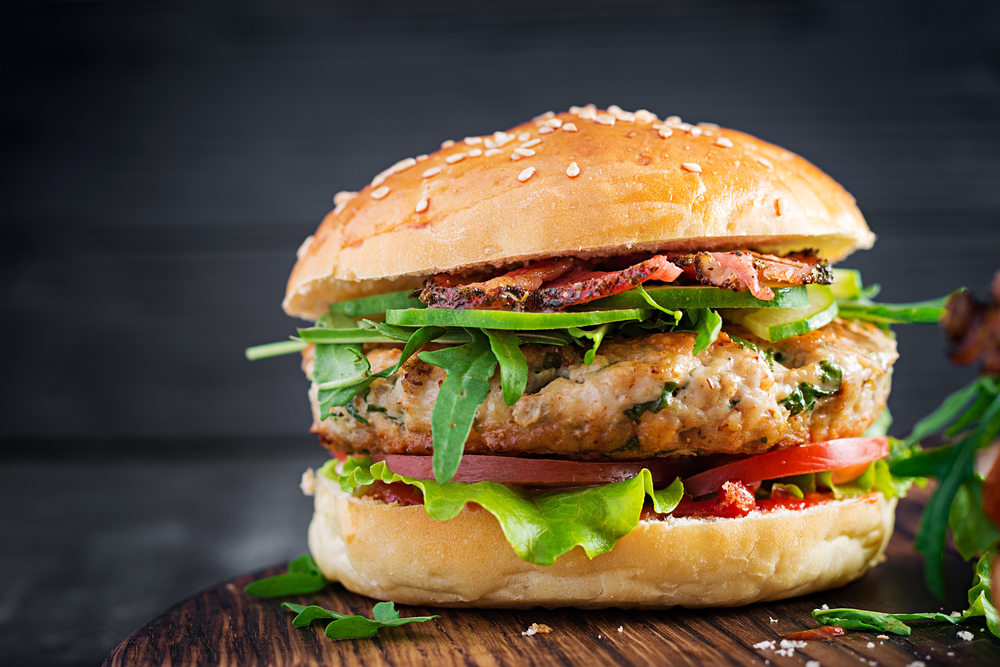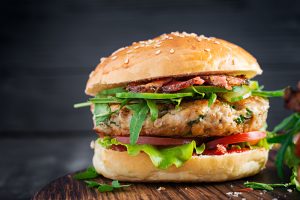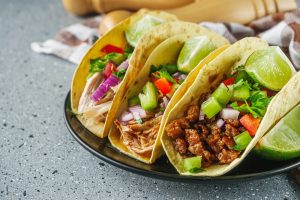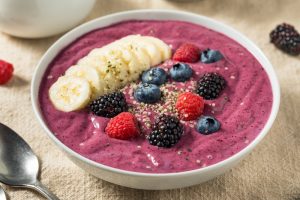Turkey burgers can be an excellent choice for weight loss, offering 30-40% fewer calories than beef burgers while delivering high protein content that promotes satiety and muscle maintenance.
A 4-ounce turkey burger contains just 170-200 calories compared to beef's 230-310 calories, but success depends on choosing the right fat ratio, preparation methods, and toppings.
Keep reading to discover exactly how to maximize turkey burgers for weight loss, including the optimal lean-to-fat ratio, smart cooking techniques, and topping swaps that can make or break your results.
The Calorie and Protein Advantage of Turkey Burgers
When you compare calories head-to-head, turkey burgers deliver significant savings.
A 4-ounce turkey burger patty contains 170-200 calories, while a similar beef patty ranges from 230-310 calories.
If you want even greater calorie reduction, turkey burgers made with breast meat only drop to just 150 calories with only 1.5 grams of fat and zero saturated fat.
The protein content makes turkey burgers particularly valuable for weight loss.
Each 4-ounce serving provides approximately 22 grams of protein, which helps maintain muscle mass while you lose weight.
This high protein content also promotes satiety, making you feel fuller longer and naturally reducing your overall calorie intake throughout the day.
Your body actually works harder to process protein compared to carbohydrates or fats.
This process, called thermogenesis, means you burn more calories simply digesting and metabolizing the protein in your turkey burger.
Research shows that higher-protein foods increase both thermogenesis and satiety more effectively than lower-protein alternatives, giving you enhanced metabolic benefits that support your weight loss goals.
The combination of fewer calories, substantial protein, and increased energy expenditure from protein processing creates a triple advantage.
You consume less, feel satisfied longer, and burn more calories through digestion—all while maintaining the muscle mass that keeps your metabolism running efficiently.
Choosing the Right Turkey for Maximum Weight Loss Benefits
Not all ground turkey delivers the same weight loss benefits.
The fat ratio you choose makes a significant difference in your calorie intake and overall results.
Nutrition experts recommend 93/7 lean ground turkey as the optimal balance for weight loss.
This ratio provides approximately 160-170 calories per 4-ounce raw serving with 22 grams of protein and 8 grams of fat, giving you enough moisture and flavor without excessive calories.
You need to watch out for higher-fat ground turkey options.
Some ground turkey sold at grocery stores includes darker thigh and leg meat, plus skin, which can boost the fat content to 20 percent or higher.
This dramatically increases calories and reduces the weight loss advantages you're seeking from choosing turkey over beef.
Reading labels becomes critical rather than simply grabbing any package labeled “ground turkey.”
Look specifically for lean percentages clearly marked on the packaging.
Generic “ground turkey” without fat ratio information often contains the higher-fat mix that undermines your weight loss efforts.
The comparison between turkey and beef at similar fat percentages reveals an interesting reality.
Side-by-side, both 93% and 85% lean ground beef actually contain slightly more protein than turkey at the same fat percentages for roughly the same number of calories.
However, turkey's main advantage lies in its lower saturated fat content, which benefits both heart health and weight management.
Making informed decisions means understanding these nuances.
Turkey burgers offer their greatest weight loss benefits when you specifically choose the 93/7 lean ratio, avoid mystery-fat generic options, and recognize that the primary advantages come from reduced saturated fat rather than dramatically different protein or calorie profiles compared to lean beef.
Smart Cooking Methods That Preserve Weight Loss Benefits
Your cooking method can either enhance or sabotage the weight loss advantages of turkey burgers.
Grilling and baking are your best options because they allow excess fat to drain away while avoiding the extra calories that come with frying.
These dry-heat methods preserve the lean profile that makes turkey burgers valuable for weight loss in the first place.
Moisture becomes the biggest challenge when cooking lean turkey.
Instead of adding oil, which can contribute 120 calories per tablespoon, use non-stick cooking spray for minimal calories.
This approach maintains the burger's moisture without the caloric penalty that defeats your weight loss goals.
Temperature control matters more with turkey than beef.
Cook your patties to an internal temperature of 165°F for food safety, but avoid overcooking which creates a dry, unappetizing result.
An overcooked turkey burger often leads to loading up on high-calorie condiments to compensate for the texture, undermining your efforts.
For extra moisture without excessive calories, mix egg whites or a small amount of milk into your ground turkey before forming patties.
These ingredients add binding and moisture while contributing minimal calories—egg whites contain only about 17 calories per large egg white, while a tablespoon of milk adds just 9 calories.
Meal prep strategies can maximize your success with turkey burgers.
Raw patties freeze well for up to three months, allowing you to portion control in advance.
Cooked turkey burgers keep in the refrigerator for 4-5 days, making batch cooking practical.
Pre-portion your patties into 4-ounce servings before cooking or freezing to maintain consistent calorie control and remove the guesswork from your weight loss plan.
Portion Control and Serving Strategies
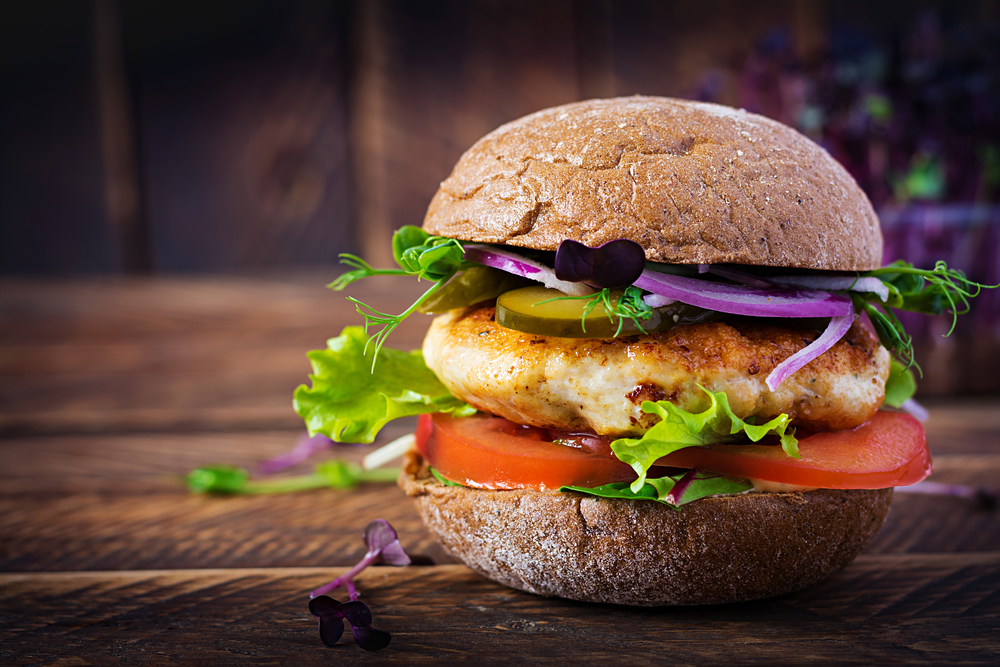
Getting portion sizes right makes the difference between weight loss success and stalled progress.
Stick to 4-ounce cooked turkey burger patties, which translates to approximately 5 ounces of raw ground turkey.
This serving size provides the protein benefits you need while keeping calories in the 160-200 range depending on your chosen fat ratio.
Your choice of bun or bun alternative significantly impacts your total meal calories.
Traditional burger buns can add 150-250 calories to your meal.
Whole grain options provide more fiber and nutrients, but lettuce wraps or serving your turkey burger over a bed of greens can save you 100-200 calories while adding volume and nutrients to your plate.
Strategic meal planning removes decision fatigue and portion guesswork from your routine.
Pre-portion your ground turkey into individual 5-ounce raw servings before storing or freezing.
This approach ensures consistent calorie intake and prevents the common mistake of eyeballing portions that gradually increase over time.
Freezing and storage become powerful tools for maintaining portion discipline.
Shape your pre-portioned turkey into patties and freeze them individually wrapped or separated by parchment paper.
This method lets you grab exactly one serving without thawing an entire package, eliminating the temptation to cook extra “while you're at it.”
Preventing diet boredom keeps you consistent with your turkey burger routine.
Create different flavor combinations using herbs, spices, and minimal-calorie seasonings like garlic powder, onion powder, or fresh herbs.
You might prepare Mediterranean-style patties with oregano and garlic one week, then switch to Southwest flavors with cumin and chili powder the next.
This variety maintains your interest without adding significant calories, making your weight loss plan more sustainable long-term.
Topping Swaps That Support Your Weight Loss Goals
Your turkey burger's toppings and condiments can transform a balanced meal into a calorie bomb that derails your weight loss efforts.
The biggest culprits include mayonnaise, bacon, and excessive cheese additions.
Just one tablespoon of mayonnaise adds about 90 calories, while two strips of bacon contribute roughly 80 calories, and a thick slice of cheese can add another 100 calories or more.
Simple substitutions deliver dramatic calorie savings without sacrificing flavor.
Switching from mayonnaise to mustard saves you approximately 90 calories per tablespoon while adding tangy flavor that complements turkey well.
Yellow mustard, Dijon, or spicy brown varieties all work effectively and contain virtually no calories.
Fresh vegetables become your secret weapon for adding volume and satisfaction to your burger.
Lettuce, tomatoes, onions, and pickles provide crunch, flavor, and nutrients while contributing minimal calories.
These additions help fill you up and make your meal feel more substantial without impacting your calorie budget.
When you want healthy fats, choose wisely between options.
A few thin avocado slices provide beneficial monounsaturated fats and creamy texture, but use moderation since a quarter of an avocado contains about 60 calories.
This choice beats processed cheese both nutritionally and often calorically, especially when you consider that many people use multiple cheese slices.
Greek yogurt-based sauces offer creamy alternatives to traditional high-calorie dressings.
Mix plain Greek yogurt with herbs, garlic, or spices to create ranch-style dips, tzatziki variations, or spicy aioli substitutes.
These options provide protein while delivering the creamy texture you crave.
A two-tablespoon serving of Greek yogurt contains only about 20 calories compared to similar amounts of creamy dressings that can contain 100-150 calories.
Common Mistakes and How to Avoid Them
Pre-made frozen turkey burgers seem convenient, but they often contain hidden obstacles to your weight loss goals.
Many commercial frozen patties include added sodium and preservatives that can cause water retention and bloating.
These products frequently contain fillers, binders, and flavor enhancers that add unnecessary calories while reducing the overall protein content you're seeking from turkey.
Restaurant turkey burgers present another common trap.
Even when you think you're making a healthy choice, restaurants often add fats during cooking and load burgers with high-calorie condiments.
A restaurant turkey burger can easily contain 600-800 calories once you factor in cooking oils, mayo-heavy sauces, and oversized portions, negating the calorie advantages you expect from choosing turkey.
Extremely lean turkey options like 99/1 fat ratios might seem ideal for weight loss, but they often backfire.
These ultra-lean varieties become so dry and flavorless that you'll likely compensate with extra condiments, cheese, or other high-calorie additions.
The dissatisfaction from eating overly dry burgers also makes your diet feel restrictive and unsustainable.
Successful weight loss with turkey burgers requires balancing taste, texture, and nutritional benefits.
The 93/7 lean ratio provides enough fat for moisture and flavor while maintaining the calorie advantages.
This balance keeps you satisfied with your meals and prevents the cycle of restriction followed by overindulgence that sabotages many weight loss attempts.
Integration becomes key for long-term success rather than viewing turkey burgers as a magic solution.
Make them part of a balanced, calorie-controlled diet that includes plenty of vegetables, appropriate portions of complex carbohydrates, and other lean protein sources.
Turkey burgers work best as one tool in your weight loss toolkit, not as your only strategy.
Plan them into your weekly meal rotation alongside other healthy options to maintain variety and prevent the monotony that leads to abandoning your weight loss plan.
Conclusion
Turkey burgers offer genuine weight loss advantages when you choose 93/7 lean ground turkey, control portions to 4 ounces, and use smart cooking methods with low-calorie toppings.
The combination of fewer calories, high protein content, and lower saturated fat makes them a valuable tool for sustainable weight loss.
Success depends on avoiding common pitfalls like pre-made frozen varieties and restaurant preparations while integrating turkey burgers into a balanced, calorie-controlled eating plan.

